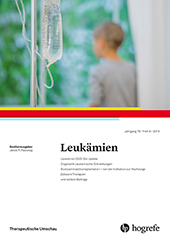Chronische Myeloische Leukämie – Update 2020
Abstract
Zusammenfassung. Die CML war die erste maligne Krankheit, bei welcher die molekularen Erkenntnisse zur Pathogenese in die Entwicklung einer spezifischen, gegen das Onkoprotein gerichteten Therapie, führte. Mit der Einführung der Tyrosinkinase Inhibitoren (TKI) um die Jahrtausendwende wurde die Behandlung der CML revolutioniert. Die Lebenserwartung von CML Patienten im Zeitalter der TKI entspricht derjenigen der Normalbevölkerung. Bei einem Teil der Patienten mit sehr gutem Ansprechen auf die TKI Behandlung, kann die Therapie unter entsprechenden Vorsichtsmassnahmen gestoppt werden mit dem Ziel, eine langfristige Therapiefreie Remission (TFR) zu erleben.
Abstract. The discovery of specific inhibitors of the BCR-ABL tyrosine kinase more than 20 years ago has revolutionized the treatment of patients with chronic myeloid leukemia (CML). Prognosis and outcome of patients considerably improved and progress in the use of the tyrosine kinase inhibitors is ongoing. In comparison to imatinib, second generation inhibitors used in first line lead to faster and deeper molecular remissions accompanied by different adverse event profiles. An essential part of the management of CML patients is to assess regularly the remaining tumor load by standardized molecular methods. Based on several clinical trials definitions of optimal response to treatment and of treatment failure have been put forward and help guide the treatment of the patients. The concept of treatment free remission was investigated extensively and is now part of the management of CML patients. Advanced stages of CML are diagnosed less frequently but are still challenging to treat. In these cases, allogeneic transplantation still plays an important role in the attempt to control the disease.



